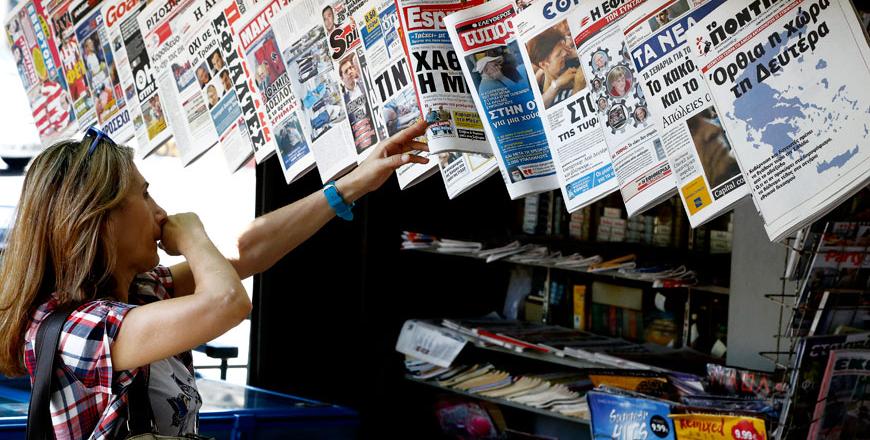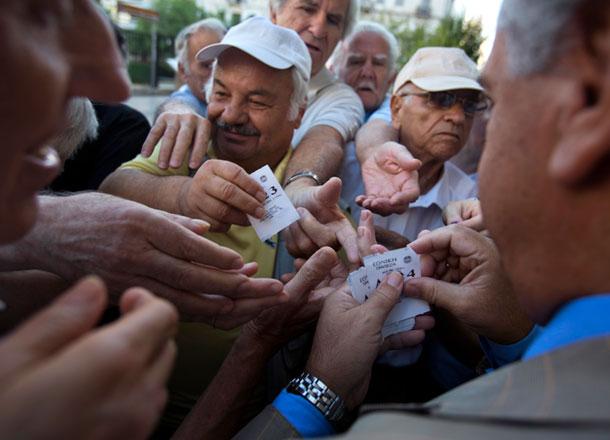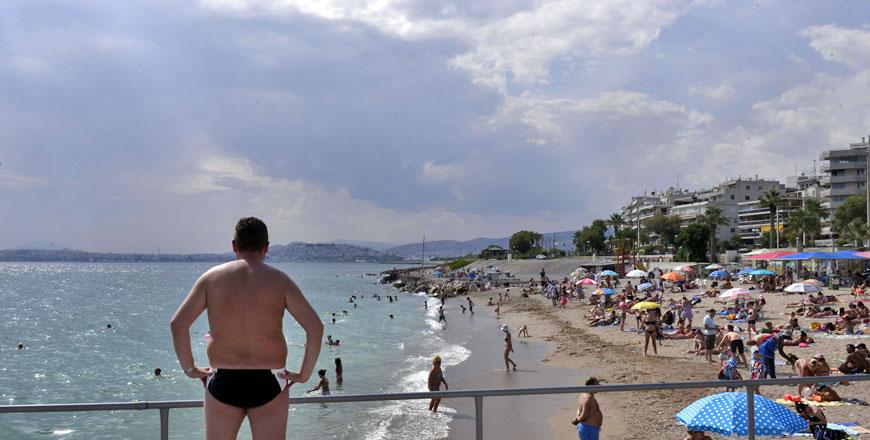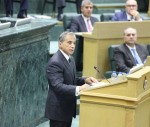You are here
Greece needs 36b euros more from EU — IMF
By AFP - Jul 02,2015 - Last updated at Jul 02,2015

A woman reads the front page of the Greek newspapers for the upcoming referendum the day's news, in central Athens, on Thursday (AP photo)
WASHINGTON/ATHENS — Greece needs 50 billion more euros ($55 billion) over the next three years, including 36 billion euros from European Union (EU) lenders, to stabilise its finances even under existing creditor plans, the International Monetary Fund (IMF) said Thursday.
In a new report on Greece’s financing needs, the IMF also cut the country’s economic growth prospects for this year to 0 per cent from 2.5 per cent forecast in April.
That growth estimate was made before Greece broke off talks with official creditors last weekend and ordered capital controls and its banks shut for a week.
The IMF’s new “preliminary draft” debt sustainability analysis for the country said the changes in Greek policies and its financial outlook since early 2015, roughly covering the period that the anti-austerity Syriza Party and Prime Minister Alexis Tsipras have led the country, “have resulted in a substantial increase in financing needs”.
Existing proposals by the Greek side and EU creditors do not address those needs.
“Greece faces a significantly larger financing need going forward than we thought last year,” a senior IMF official told journalists.
The new analysis suggests that “a more comprehensive debt operation will be required to ensure that debt will remain sustainable,” the official said.
On top of the need for more cash, the IMF indicated that creditors need to double the maturity of existing official loans to Greece to 40 years from 20 years.
“This is a dramatic move,” the official added.
Separately, Greece’s dive into financial uncertainty is forcing struggling businesses to take unusual steps to survive, including hoarding euros in cash.
The government’s announcement it was closing banks this week to stem a panicked rush to withdraw money, left many ordinary Greeks high and dry.
“I put aside as much cash as possible” in advance, said an Athens baker Taso Paraskevopoulos, who had expected the controls to be imposed as the country staggered towards a default on a debt repayment to the IMF.
“I sometimes need hundreds of euros a day to pay suppliers and expenses, I cannot allow myself to be caught short,” he added, making it quite clear he blames the radical left ruling party Syriza for the crisis.
Five months of fruitless negotiations between Greece and its EU-IMF creditors ended with the government enforcing strict credit controls to prevent an already weak banking system from hemorrhaging.
In theory, the controls will be lifted following Sunday’s referendum on whether or not Greece should accept the creditors’ conditions in the latest bailout offer, though many here believe the fallout will go further and deeper.
Air Liquide, a gas supply company that employs 130 people, told AFP it paid its employees in advance this month to make sure they could access their money.
“We are lucky we produce locally, sell locally, and work with local people. We’ve told our few foreign suppliers about the government’s decision, asking them to be patient,” a spokesman said.
The capital controls forbid money transfers abroad, except by express permission from the finance ministry.
Businesses which import their raw materials have been the hardest hit, says Vassilis Korkidis, the head of the National Confederation of Hellenic Commerce (ESEE).
Established marble company Moschous, which boasts clients around the world, thought ahead “by ordering machines in advance”, boss Constantin Baxevanakis said.
He is more worried, however, about the future. Baxevanakis believes the measures “are going to last”.
Cash hunting a national sport
Stathis Potamitis, the head of a law office which employs around 100 people, agrees.
“it’s easy to close banks, more difficult to re-open them... A big client called me on Tuesday to say he would pay in 120 days,” he said.
As unease spreads, getting one’s hands on cash has become a sort of national sport, with businesses from restaurants to car mechanics telling customers paying by card is no longer an option.
And what if the crisis drags on? asked Sotiris Papantonopoulos, the head of online insurance broker Insurancemarket, which employs 70 people.
Launched in 2011 despite the financial crisis, the company was in expansion and had intended to take on other 60 people in the coming months, “but now everything is on hold”, said Papantonopoulos, visibly upset after having to ask some of his employees not to come to work this week.
“If the measures remain in place for two months, we’ll close, it’s over. Our turnover has already dropped 70 per cent over the past few days” as clients who were supposed to renew contracts this week failed to do so.
Withdrawals from ATMs are limited to 60 euros ($66) a day, which has severely complicated economic activity in a country where electronic money transactions are far rarer than cash transactions.
Thomas Douzis, 28, the head of the high-end grocers “Ergon”, said it had caused a real headache for many.
“Our supply chain relies on 300 or so small producers from across the country who are not always equipped to take card payments, and in any case want cash,” he added.
Douzis, who has six shops in Greece, was supposed to open a third shop abroad at the end of August, this time in Miami, but may be forced to put that project on hold for the unforeseeable future.
Related Articles
FRANKFURT () — Eurozone ministers approved the launch of Greece bailout talks and the European Central Bank (ECB) boosted its cash lifeline
ATHENS — Greeks took to beaches, cafes and churches on Sunday, just like they do every week, but the mood was downbeat as the country teeter
Greece's parliament was dissolved Wednesday ahead of an early election warily watched by markets and international creditors concerned that the austerity-weary country could starting unwinding unpopular fiscal reforms.


















